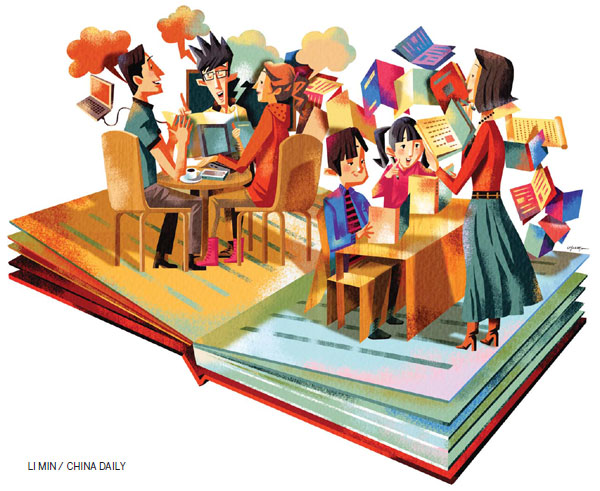School for thought
Updated: 2015-08-28 08:28
By Zhang Zhouxiang and Zhang Chunyan(China Daily Europe)
|
|||||||||||
BBC experiment triggers debate on UK and chinese education methods
Over the past three decades, China has witnessed extraordinary economic growth, which has generated interest across the world. Chinese education is considered one of the important factors behind that development.
With Chinese students often dominating international exams and education rankings, supporters say that the Chinese education system is world-class, producing respectful students who work hard in the face of fierce competition.

However, critics say the Chinese style of education is confined too strictly to absolute obedience. While Chinese students gain good exam scores, they don't always shine in scientific research as much as their Western peers, they say.
It has also been reported that China is introducing British-style elements into its education system because Chinese parents find it more creative.
A three-part BBC documentary, Are Our Kids Tough Enough? Chinese School, which was broadcast on Aug 4, 11 and 18, has reignited a heated debate across the globe, especially in China and Britain.
In the program, five Chinese teachers took responsibility for educating 50 students for four weeks at Bohunt School in Hampshire, southern England. Learning together in one classroom, the students, of mixed abilities, were put through a Chinese-style education system.
For four weeks, they wore typical Chinese school uniform and started the school day at 7 am. Once a week, there was a pledge to the two national flags. Lessons were focused on note-taking and repetition. Group exercises were undertaken, and students had to clean their own classrooms.
In the first two episodes, many teenagers found it difficult to adapt to the Chinese methods. The teachers were also not prepared for the stark differences between Chinese and British students. The teachers complained that classes were "chaotic".
After all kinds of ups and downs for Chinese teachers and British students, in tests at the end of the period, overall the students studying the Chinese method achieved marks about 10 percent higher in math and science compared with the rest of their year group, who continued to be taught by their regular teachers in the English manner.
Today's Top News
Xi meets with former KMT chairman
Migrants protest as Hungary shutters Budapest train station
China manufacturing PMI falls to 49.7 in August
Migrant trains reach Germany as EU asylum system creaks
Second homes in China need lower down payment
Chinese athletes win 9 medals at Beijing world championships
Houston physicist invited to view V-Day parade in Beijing
Journalist, securities regulatory official held for stock market violation
Hot Topics
Lunar probe , China growth forecasts, Emission rules get tougher, China seen through 'colored lens', International board,
Editor's Picks

|

|

|

|

|

|






